Tense Times in the Middle East
The situation in the Middle East is now more tense than it has been for a long time. Following the recent US attack on Iran, Norway's Foreign Minister Anniken Huitfeldt warns that the risk of a major war in the region is high. Many countries in the area are worried about what might happen next.
The fear stems from both historical conflicts and the current political situation. Several experts believe that if the situation does not calm down, it could lead to serious consequences for many people.
The international community is closely monitoring the developments. Several countries are calling for dialogue and diplomatic solutions to avoid a larger crisis.
International Response
Following the attack, several countries have reacted strongly. Many express concern about how this could affect global stability. There is also great fear that other superpowers might be drawn into the conflict.
Norway's Foreign Minister emphasizes the importance of the international community coming together to prevent a major conflict. Huitfeldt urges caution and responsibility among world leaders.
Several organizations are now working to ensure that necessary aid measures are in place in the region. This is crucial to support those most affected.
What Can Be Done Next?
For many, the situation seems serious. Therefore, several countries are now seeking solutions to prevent further escalation. Good conversations and cooperation between countries are important.
Some experts suggest that economic sanctions against the involved countries might ease the conflict. Others believe this could make matters worse. One of the biggest challenges is finding a balance between security and diplomacy.
Conflicts like these highlight the importance of international cooperation. The whole world is now hoping for a peaceful resolution.
